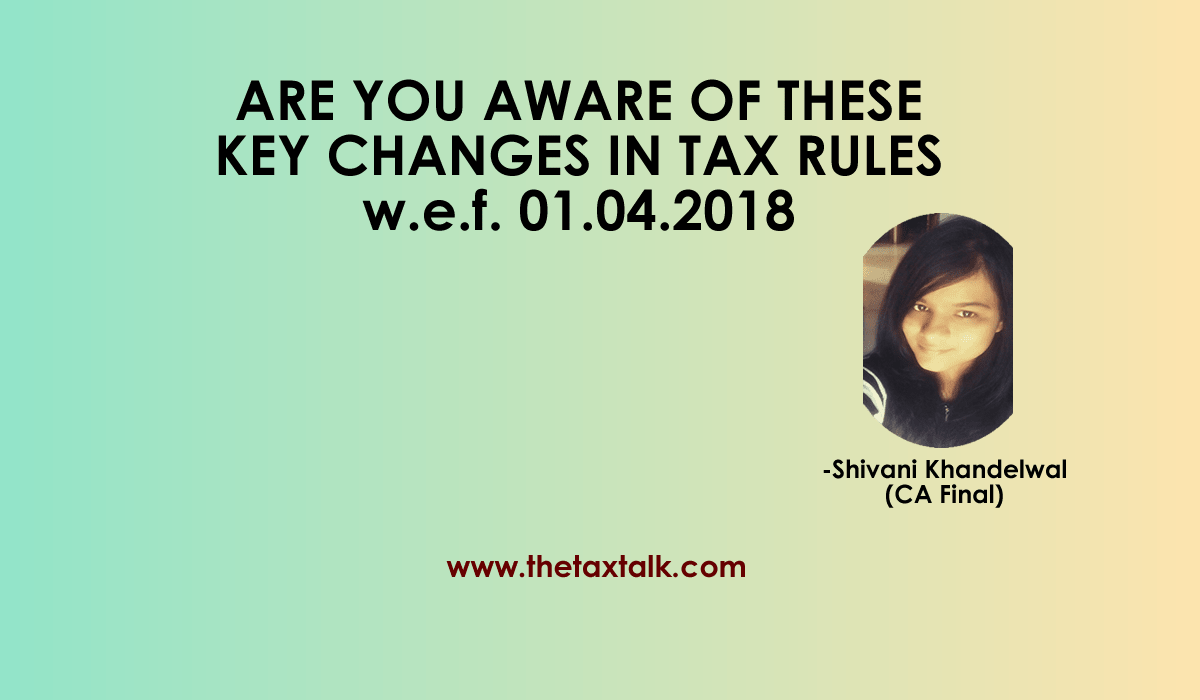![]()
ARE YOU AWARE OF THESE KEY CHANGES IN TAX RULES TO COME INTO EFFECT FROM 1ST APRIL, 2018?
“You can’t stop the future, you can’t rewind the past, only way we can learn, achieve&live, is if we grow and the only way that we can grow is if we CHANGE”.
Before discussing the key changes in tax rules, let’s have a glimpse of major changes that will come for Indian companies from 1st April, 2018. From 1st April, 2018, Indian Accounting Standard (Ind AS) 115 would be effective, as a result the other two standards- Ind AS- 18 and Ind AS- 11 which are related to revenue and construction contracts, would cease to exist.
Another big change that will be witnessed in the economy will be roll-out of E-way Bill. The businesses which transport goods of over RS. 50,000 from one state to another will have to carry an e-way bill from 1st April.
The Budget 2018 announced on February 1 this year by the Union Finance Minister Arun Jaitley enshrined a host of changes in the Income Tax (I-T) law. As the new income tax (I-T) rules are set to come in force from Sunday (first day of the financial year 2018-19), the tax payers ought to know the amendments in India’s direct tax law.
The tax reforms will impact individual taxpayers in a number of ways, such as the standard deduction of Rs 40,000 instead of the transport allowance and medical expenses.
Here’s a list of tax changes that will impact all taxpayers in country:
Corporate tax rate
Corporate tax rate that is currently 30% has been reduced for a set of companies. The corporate entities that have a turnover of upto Rs 250 crore are meant to pay only 25% corporate tax instead of 30% earlier.
Interest Income exemption for senior citizens
The finance minister offered ample amount of benefits for the senior citizens this year. The most important of them probably is the one that allows the senior citizens to avail exemption on account of interest income earned from the bank. The current amount of interest income of Rs 10,000 that is allowed to be exempted has been raised to Rs 50,000 in case of senior citizens. For the purpose, a new section 80TTB has been introduced.
TDS (tax deducted at source) under section 194A will not be applicable on any fixed deposit scheme or recurring deposit schemes for the senior citizens.
Breather for senior citizen on medical expenses
The deduction limit for health insurance premium or medical expenditure was increased from Rs 30,000 to Rs 50,000 under section 80D.
The deduction limit for medical expenses for critical illness was also hiked from Rs 60,000 (for senior citizens) and Rs 80,000 (for very senior citizens) to Rs 1 lakh, under section 80DDB.
LTCG re-inducted
After a gap of 14 years, the long-term capital gains tax was reintroduced in the 2018-19 Budget. A 10 per cent tax will be levied on equity investments exceeding Rs 1 lakh from sale of shares. At present, shareholders pay a 15 per cent tax on capital gains made on share sale within a year of purchase. If the shares are sold after a year, the tax is nil.
Standard deduction
Though the tax slabs were not changed this year, the finance minister reintroduced the standard deduction method. A standard deduction of Rs 40,000 will be effective in lieu of transport allowance and medical reimbursement.
The Central Board of Direct Taxes had previously said that the standard deduction can be claimed directly and would not require any proofs or bills to avail it.
Medical, travel allowances will be taxed
With the induction of standard deduction, medical and travel allowances will be taxed from next fiscal. Medical allowances up to Rs 15,000 and travel allowance till Rs 1,600 per month used to be tax free and could be claimed by furnishing bills.
Cess now 4%
Finance Minister Arun Jaitley has hiked the educational cess on income tax and corporation tax to 4 per cent. At present, individual taxpayers shell out a 3 per cent cess – 2 per cent cess for primary education and 1 per cent cess for secondary and higher education.
Pradhan Mantri Vaya Vandana Yojana
Pradhan Mantri Vaya Vandana Yojana was extended up to March 2020, under which senior citizens can invest up to Rs 15 lakh. The current limit is Rs 7.5 lakh per senior citizen.
Dividend Distribution Tax on equity MFs
Dividend distribution tax (DDT) was introduced on equity mutual funds at the rate of 10 per cent in Budget 2018-19. The move was proposed to offer a level field for different dividend distributing schemes.
National Pension System is tax free
The withdrawal of pension money was made tax free for non-employee subscribers. There is no such provision at present.
Hopefully, this article will benefit large number of taxpayers.
[button color=”” size=”” type=”round” target=”” link=”https://thetaxtalk.com/”]home[/button] [button color=”” size=”” type=”round” target=”” link=”https://thetaxtalk.com/submit-article-publish-your-articles-here/”]Submit Article [/button] [button color=”” size=”” type=”round” target=”” link=”https://thetaxtalk.com/discussion-on-tax-problem/”]Discussion[/button]


